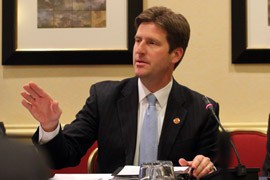Cronkite News has moved to a new home at cronkitenews.azpbs.org. Use this site to search archives from 2011 to May 2015. You can search the new site for current stories.
As cuts loom, Stanton and other mayors criticize Congress for inaction
WASHINGTON – Phoenix Mayor Greg Stanton joined other mayors Thursday who criticized Washington for its inability to act on the budget, a failure that could cripple local economies.
The mayors, in Washington for the winter meeting of the U.S. Conference of Mayors, were part of a session focused on the looming “sequester” – drastic, automatic budget cuts set to take effect March 1 if no budget deal is reached.
“It’s almost embarrassing that we’ve gotten to this point where we have to get so close to the cliff, so close to the brinkmanship,” Stanton said after the meeting. “And that’s not right. That’s not the way our government should operate.”
Stanton is chairman of the mayors’ Defense Conversation Task Force, which was created to look at the effect of reduced military size and funding on city economies.
Defense funding makes up half of the $1.2 trillion federal budget cuts that would be phased in over the next nine years, unless Congress can come up with an alternative.
Cuts of that magnitude, to both the defense and non-defense sides of the federal budget, could result in the loss of 2.14 million jobs and a 1.5 percent increase in unemployment within several years, said Cord Sterling, vice president of Aerospace Industries Association.
As many as 35,000 defense-related jobs could be lost in Arizona alone, according to a report funded by the association.
Sterling said one reason Congress is having trouble coming to a budget agreement is a disagreement on how to deal with cuts to entitlement programs, such as Social Security. House Republicans want to wrap that into discussions about raising the debt ceiling, while President Barack Obama has said he will not negotiate the debt ceiling but will tackle entitlement cuts separately.
Sterling said that until the two sides “come to some resolution on how they’re going to move forward, that’s problematic.”
Besides being painful in the short run, sequestration cuts would have little beneficial impact in the long run, said Shai Akabas, senior policy analyst with the Bipartisan Policy Center. He said they would not solve many of the country’s long-term budget problems.
Akabas said the current plan – to cut each budget line item by a certain percentage – would be “chaos.” He noted, for example, that a cut to the defense budget would not slow the growth of veterans benefits, even though they are expected to soon exceed current personnel costs.
“That can be reformed with sensible policies passed by Congress. Sequester will do absolutely nothing to change that trend, similar with procurement issues and other such problems,” Akabas said.
And on Capitol Hill, one legislative aide said, sequestration is swallowing up every other issue that lawmakers might want to address, including immigration reform, rebuilding the country’s infrastructure and domestic policy.
“I would be lying to you all if I said we could begin to tackle any of this without dealing with the sequestration issues in front of us,” said Darrel Thompson, an aide to Senate Majority Leader Harry Reid. “That is the 800-pound gorilla on Capitol Hill, and everyone knows it.”
Stanton, who jokingly described the meeting as “everything you wanted to know about sequestration, but were afraid to ask,” said afterward that he is planning a march on Washington if a deal is not reached. The march would be scheduled for late February, as debate over the budget is expected to continue until then.
“All the budget deal on Jan. 1 did was kick the can down the road,” Stanton said. “Sequestration is still looming over our cities, it’s still looming over our local economies.”








